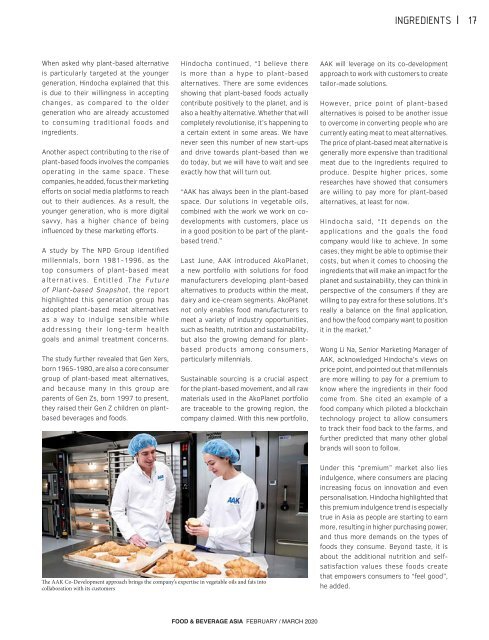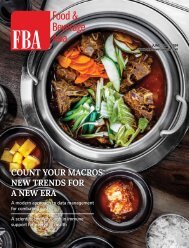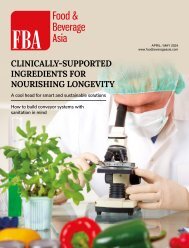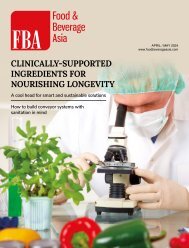Food & Beverage Asia February/March 2020
Food & Beverage Asia (FBA) is the leading source of food and beverage news in Asia since 2002. FBA delivers a comprehensive view of the food and beverage landscape, spanning across the latest health and nutrition trends and industry innovations in ingredients, recipe formulations, food science, sustainability, packaging, and automation, as well as advancements in agri and food-tech.
Food & Beverage Asia (FBA) is the leading source of food and beverage news in Asia since 2002. FBA delivers a comprehensive view of the food and beverage landscape, spanning across the latest health and nutrition trends and industry innovations in ingredients, recipe formulations, food science, sustainability, packaging, and automation, as well as advancements in agri and food-tech.
Create successful ePaper yourself
Turn your PDF publications into a flip-book with our unique Google optimized e-Paper software.
INGREDIENTS<br />
17<br />
When asked why plant-based alternative<br />
is particularly targeted at the younger<br />
generation, Hindocha explained that this<br />
is due to their willingness in accepting<br />
changes, as compared to the older<br />
generation who are already accustomed<br />
to consuming traditional foods and<br />
ingredients.<br />
Another aspect contributing to the rise of<br />
plant-based foods involves the companies<br />
operating in the same space. These<br />
companies, he added, focus their marketing<br />
efforts on social media platforms to reach<br />
out to their audiences. As a result, the<br />
younger generation, who is more digital<br />
savvy, has a higher chance of being<br />
influenced by these marketing efforts.<br />
A study by The NPD Group identified<br />
millennials, born 1981-1996, as the<br />
top consumers of plant-based meat<br />
alternatives. Entitled The Future<br />
of Plant-based Snapshot, the report<br />
highlighted this generation group has<br />
adopted plant-based meat alternatives<br />
as a way to indulge sensible while<br />
addressing their long-term health<br />
goals and animal treatment concerns.<br />
The study further revealed that Gen Xers,<br />
born 1965-1980, are also a core consumer<br />
group of plant-based meat alternatives,<br />
and because many in this group are<br />
parents of Gen Zs, born 1997 to present,<br />
they raised their Gen Z children on plantbased<br />
beverages and foods.<br />
Hindocha continued, “I believe there<br />
is more than a hype to plant-based<br />
alternatives. There are some evidences<br />
showing that plant-based foods actually<br />
contribute positively to the planet, and is<br />
also a healthy alternative. Whether that will<br />
completely revolutionise, it’s happening to<br />
a certain extent in some areas. We have<br />
never seen this number of new start-ups<br />
and drive towards plant-based than we<br />
do today, but we will have to wait and see<br />
exactly how that will turn out.<br />
“AAK has always been in the plant-based<br />
space. Our solutions in vegetable oils,<br />
combined with the work we work on codevelopments<br />
with customers, place us<br />
in a good position to be part of the plantbased<br />
trend.”<br />
Last June, AAK introduced AkoPlanet,<br />
a new portfolio with solutions for food<br />
manufacturers developing plant-based<br />
alternatives to products within the meat,<br />
dairy and ice-cream segments. AkoPlanet<br />
not only enables food manufacturers to<br />
meet a variety of industry opportunities,<br />
such as health, nutrition and sustainability,<br />
but also the growing demand for plantbased<br />
products among consumers,<br />
particularly millennials.<br />
Sustainable sourcing is a crucial aspect<br />
for the plant-based movement, and all raw<br />
materials used in the AkoPlanet portfolio<br />
are traceable to the growing region, the<br />
company claimed. With this new portfolio,<br />
AAK will leverage on its co-development<br />
approach to work with customers to create<br />
tailor-made solutions.<br />
However, price point of plant-based<br />
alternatives is poised to be another issue<br />
to overcome in converting people who are<br />
currently eating meat to meat alternatives.<br />
The price of plant-based meat alternative is<br />
generally more expensive than traditional<br />
meat due to the ingredients required to<br />
produce. Despite higher prices, some<br />
researches have showed that consumers<br />
are willing to pay more for plant-based<br />
alternatives, at least for now.<br />
Hindocha said, “It depends on the<br />
applications and the goals the food<br />
company would like to achieve. In some<br />
cases, they might be able to optimise their<br />
costs, but when it comes to choosing the<br />
ingredients that will make an impact for the<br />
planet and sustainability, they can think in<br />
perspective of the consumers if they are<br />
willing to pay extra for these solutions. It’s<br />
really a balance on the final application,<br />
and how the food company want to position<br />
it in the market.”<br />
Wong Li Na, Senior Marketing Manager of<br />
AAK, acknowledged Hindocha’s views on<br />
price point, and pointed out that millennials<br />
are more willing to pay for a premium to<br />
know where the ingredients in their food<br />
come from. She cited an example of a<br />
food company which piloted a blockchain<br />
technology project to allow consumers<br />
to track their food back to the farms, and<br />
further predicted that many other global<br />
brands will soon to follow.<br />
The AAK Co-Development approach brings the company’s expertise in vegetable oils and fats into<br />
collaboration with its customers<br />
Under this “premium” market also lies<br />
indulgence, where consumers are placing<br />
increasing focus on innovation and even<br />
personalisation. Hindocha highlighted that<br />
this premium indulgence trend is especially<br />
true in <strong>Asia</strong> as people are starting to earn<br />
more, resulting in higher purchasing power,<br />
and thus more demands on the types of<br />
foods they consume. Beyond taste, it is<br />
about the additional nutrition and selfsatisfaction<br />
values these foods create<br />
that empowers consumers to “feel good”,<br />
he added.<br />
FOOD & BEVERAGE ASIA FEBRUARY / MARCH <strong>2020</strong>


















